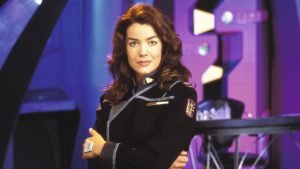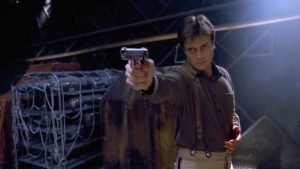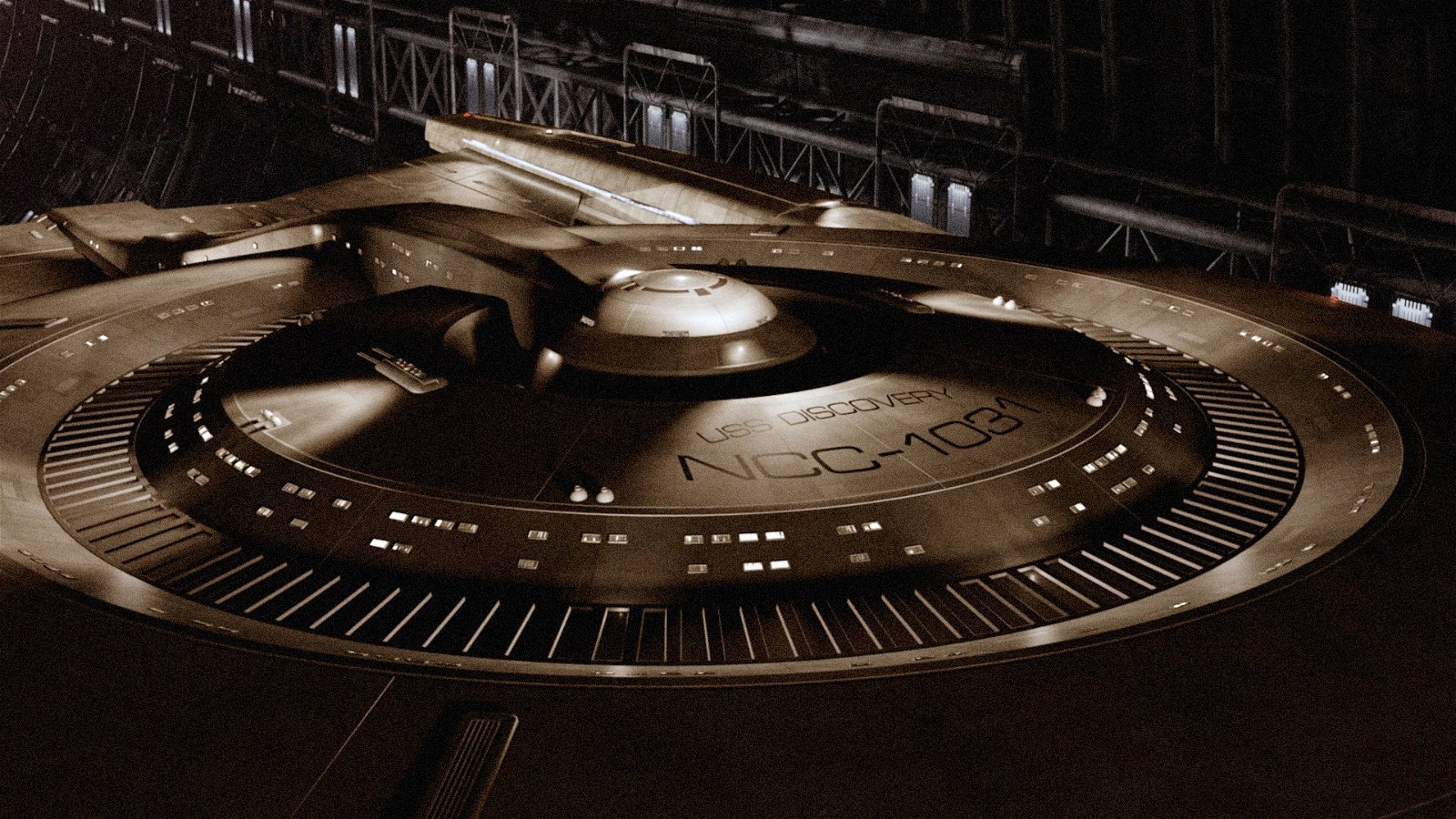Science fiction, particularly in television and the movies, has a tendency to sidestep religion. There are franchises that deal with religion directly—such as Star Wars with the Force—but more often than not, religion tends to be ignored, at least in the human characters. Star Trek is a good example of this: we see a chapel in the Enterprise in the original series episode “Balance of Terror,” but we never see a chaplain. The Enterprise-D has a ship’s counsellor, but not a priest or a rabbi. Religion appears in a number of alien cultures—most often treated with great respect—but while we come away with an understanding of Worf’s Klingon culture and religion, we would be hard pressed to deduce anything about the spirituality of Captain Picard or Commander Riker. Whether or not the new series, Star Trek: Discovery, will continue this trend remains to be seen.
This is, however, an understandable omission. Most of the action in any given Star Trek episode occurs while the characters are engaged in their professional lives, and one of the bridge crew being a Catholic, Anglican or Muslim is not something that would come up in the middle of setting a course, firing phasers, or serving on an away mission. The lack of religion certainly does not make the ideas the show explores any less interesting or the action any less gripping.
But while dealing with the religion of its characters is not something that any given science fiction show needs to do, those shows that have dealt directly with religion tended to be better for it. Unlike Star Trek, shows like Babylon 5, Firefly, and the 2003 Battlestar Galactica not only dealt directly with religion, but also used it to deepen the story and our understanding of the characters.
One of the most nuanced explorations of religion in science fiction television occurred not in Star Trek, but in Babylon 5, which presented a number of different alien and human religions. One of the key characters—and a moral compass for the show—is Delenn, a member of the Minbari religious caste who serves not only as the ambassador to Babylon 5, but on her world’s ruling council. But while she uses her faith to inform her morality, she is also well aware of the danger of combining religion and politics—as the series progresses, we learn that she cast the deciding vote that started a holy war of genocide against humanity after a misunderstanding ended in the death of her mentor, the Minbari leader Dukhat, and she carries the guilt for that throughout her life.

Religion was also used to illuminate and fill out the inner lives of some of its human characters. A plotline of the first season episode “TKO” centred on Lt. Commander Susan Ivanova’s unwillingness to sit Shiva—a Jewish mourning ritual—after the death of her estranged father. Through the actions of Ivanova and Rabbi Koslov, we see the degree to which Ivanova is unable to work through her feelings and her grief, and how she finally does so, providing a window into her psyche that deepens our understanding of her as a person.
While religion can provide a window into a character’s soul, it can also create conflict between two sympathetic characters. This played out in Firefly between Captain Malcolm Reynolds and Shepherd Book. Captain Reynolds was a good man who fought on the losing side of a civil war, and as a result lost his faith and now lives in a state of moral ambiguity. This leaves him openly antagonistic to Shepherd Book, who left his old life behind to become a man of faith. Each is very much the antithesis of the other—we never really learn who Book was over the course of the series, but it is heavily implied that his religious life is a refuge from and a way of atoning for being the type of absolute pragmatist embodied by Captain Reynolds.

Between them, Captain Reynolds and Shepherd Book provide two opposing moral compasses throughout each episode, with Reynolds representing the pragmatic and Book representing the altruistic. Neither one is entirely comfortable dealing with the other—Captain Reynolds is challenged to set aside his pragmatism to do and be better by Shepherd Book, while Book’s altruism is challenged by Reynolds’ understanding that what is necessary must come first. At the same time, there is a mutual respect between them; a recognition that both approaches have value. This creates a character interaction that would otherwise be absent, or at least more difficult to make believable or resonate with the viewer.
Both Babylon 5 and Firefly have a very modern approach to how they handle religion and the spirituality of their main characters—it is a matter of personal belief or faith, without the appearance of a divine force or higher power to justify it. The 2003 Battlestar Galactica took a different approach—by the end of the first season, it had been explicitly established that there is a higher power or divine being of some sort manipulating events towards an unknown agenda.
We never discover just what or who this divine power is, or the true nature of its plan. We learn that it exists, that the Cylons call it “God,” that it has two supernatural or angelic agents (head-Baltar and head-Six) who are openly manipulative, and that it is using its agents to influence events. We do not know if the deities worshipped by the survivors in the fleet—who appear to have their own power and agency revealed through prophecy—are separate entities, or just the Cylon’s divine being under different names. The only solid information we ever receive is at the end of the series finale, where it is revealed that it does not like the name “God.” The characters’ reactions to the existence and presence of this divine power drive the plot of the show.
This begins with the Cylons, who, attempting to understand and carry out their god’s plan, commit genocide against humanity. But the humanoid Cylon models’ reactions to the question of faith are far from uniform. The Number Ones make a show of religious devotion while in reality being atheists, the Twos are fanatically religious, and most are in between. By the end of the second season, many of the Cylons have come to believe that they were wrong about what their god wanted, and that their attack on humanity was a horrific mistake—this in turn leads to a Cylon civil war. Likewise, the human characters in the show have their own reactions as matters escalate—the otherwise secular Laura Roslin takes the role of a prophet after seeing visions, many characters (such as Commander Adama) shrug their shoulders and attempt to get on with business as usual, and the atheist Gaius Baltar undergoes a religious conversion to the Cylon god. The show presents all of these approaches to spiritual matters as inadequate, unable to encompass the experience or lead to true understanding. Baltar’s character arc encompasses this, with the character alternating between basking in his newfound faith, struggling against it, and slipping into full denial of it. This allows the show to explore the experience of religion under pressure to great effect.
Based on the track record of its predecessors, it is unlikely that Star Trek: Discovery will delve into the spirituality of its human characters. Further, whether the show is good, great, or bad will not be determined by the presence of religion or lack thereof. But religion and spirituality is part of our basic humanity—from the fundamentalists who allow religion to subsume them to the atheists who reject it. Star Trek: Discovery may very well not elect to include this facet of our nature, but, if it did, it would have a plethora of new character interactions, motivations, and reactions to explore, in turn providing a better look into the psyche and humanity of its cast.




